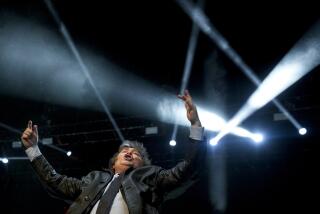‘Attack on Sovereignty’ Thwarted, Alfonsin Says
- Share via
BUENOS AIRES — President Raul Alfonsin said Tuesday that by refusing to negotiate with army mutineers, the Argentine government repulsed “an attack against the sovereignty of the people and the institutions of the nation.”
The leader of the four-day revolt, right-wing Col. Mohamed Ali Seineldin, was taken into custody earlier in the day after surrendering control of his several hundred rebels, most of whom were allowed to return to their units.
The president, elected in 1983 after a seven-year military dictatorship, initially had described the third military revolt against his government as a minor problem that posed no threat. But his remarks to an agricultural conference Tuesday implicitly acknowledged that the revolt had seriously challenged the authority of the elected government.
Conditions Denied
In the face of persistent reports that the government struck a deal to end the rebellion, Alfonsin was vehement in insisting that the insurrection was defeated “without any negotiation, without conditions of any kind.”
He said those who had called for an armed assault against the rebel stronghold were “vampires disguised as critics, who were saddened because the solutions were found without spilling blood. Better a dialogue of more than two hours than a battle, even if only for five minutes, that would have cost the lives of Argentines.”
The discussion was so long, he said, “precisely because no conditions were accepted.”
The president was referring to a meeting between Seineldin and Gen. Jose Dante Caridi, commander of the army, that was held Sunday afternoon while loyalist tanks stood poised to attack rebels in the Villa Martelli munitions garrison, on the edge of the capital. Seineldin agreed during the meeting to end the revolt, and the loyalist forces withdrew, although the 54-year-old Falklands War veteran remained with his men for another 30 hours before his detention Tuesday.
Rocks and Firebombs
During the talks, hundreds of demonstrators attacked the gate of the rebel base with rocks and firebombs for hours, unrestrained by either police or loyalist soldiers. The mutineers fired at the angry crowd, mainly with rubber bullets. Police finally stepped in, but the conflict cost three lives and left about 40 wounded.
Seineldin had said he did not seek power but rather wanted to “restore the honor of the army,” in the form of an amnesty for officers jailed for human rights abuses during the 1976-83 military dictatorship. Five former junta members and a few other officers were jailed for their part in the deaths of at least 9,000 people in the military’s campaign against left-wing subversion.
Seineldin told reporters Monday that Caridi promised to step down, but the rebel leader said he dropped his demand for amnesty because the government refused to consider the issue.
There was speculation that Caridi made a personal decision to retire, without Alfonsin’s agreement, in return for Seineldin’s surrender, in what the army could consider an internal solution. Some reports said Caridi would be gone by Christmas and would be replaced by Gen. Isidro Bonifacio Caceres, a highly respected officer who handled Seineldin’s surrender.
Caridi had carried out a purge of officers who took part in the previous two uprisings, and last month the army denied Seineldin a promotion to general.
However, Alfonsin has stated that Caridi will stay on.
“The excuse cannot be offered that this involved an internal problem,” the president said, “because what was being sought here, in one form or another, was an attack against the sovereignty of the people and institutions of the nation.”
Alfonsin said he understood there was anxiety in the army--”only a fool could be unaware of that”--aggravated by severe budget problems. He said he realized that the army sought recognition for its role in ending guerrilla violence in the mid-1970s, “a struggle that was nearly a war in which it was necessary to recover the authority of the institutions of the nation.”
However, he said, “it is absolutely necessary . . . that there not be impunity for any of the grave errors that were committed.” He said the civil courts will, according to law, continue to handle the pending cases, declaring: “There it is, and there it will be, until the society determines otherwise.”
Alfonsin had made judgment of the “dirty war” offenders a central goal of his presidency. But the two previous insurrections prompted two major concessions: a time limit on filing charges and a law limiting trials to senior officers who gave the orders. Alfonsin’s supporters argued that the alternative was continued military friction in a nation that has had six coups since 1930.
Robert A. Potash, an American expert on the Argentine military, told the news magazine Somos that Alfonsin’s previous concessions appear to have been a mistake, encouraging soldiers to think that they need only take up arms “and the government will simply reverse all that it has done until now.”
“The rebels now want it all,” Potash said. “In some ways it is comparable to the hijacking of a plane. . . . If the rebels have a complaint, the soldiers should present it to Congress, and not with guns in their hands. This is not the way to construct a democratic system.”
More to Read
Sign up for Essential California
The most important California stories and recommendations in your inbox every morning.
You may occasionally receive promotional content from the Los Angeles Times.













